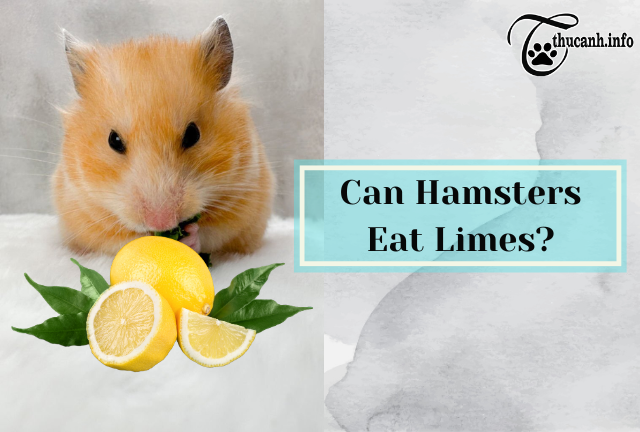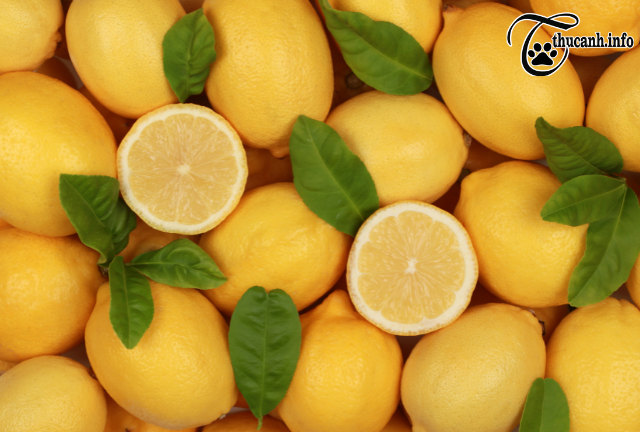Discover the Truth: Can Hamsters Eat Lemons? Curiosity aroused as to whether lemons are safe for your beloved hamster? Find out with thucanh.info whether lemon makes for an interesting and nutritious dish or needs to be cautious. Don’t miss this essential guide to keeping your hamster’s taste buds and health in perfect harmony!
1. Can Hamsters Eat Limes?
Yes, hamsters can eat limes in moderation. Limes can be a source of vitamin C and antioxidants for them. However, it’s crucial to avoid overfeeding, as excessive citrus fruits may cause digestive issues. Always introduce new foods slowly and monitor your hamster’s response. Consulting a veterinarian is recommended to ensure a balanced and suitable diet for your furry friend.

A Citrus Delight: Can Hamsters Eat Limes Safely?
2. Understanding the Nutritional Value of Limes
Hamsters are adorable and delicate pets, and their diet plays a crucial role in keeping them healthy. As responsible hamster owners, we must be mindful of their nutritional needs and make informed choices about the foods we offer them. One common question that arises is whether hamsters can eat limes. Let’s delve into their dietary requirements and find out if limes can be a suitable addition to their balanced diet.
- Limes are rich in vitamin C, a vital nutrient known for its immune-boosting properties.
- Additionally, limes contain small amounts of vitamins A and B6, iron, calcium, and potassium.
- While these nutrients are beneficial for humans, it is essential to evaluate if they align with a hamster’s dietary requirements.
2.1 The Safety of Limes for Hamsters: Benefits and Risks
Limes are known for their high vitamin C content, which is essential for boosting the immune system and promoting overall well-being. Additionally, limes contain antioxidants that can help combat free radicals and reduce oxidative stress. These potential benefits make limes seem like a healthy treat for our furry friends.
However, it’s crucial to approach this citrus fruit with caution. While small amounts of lime can be beneficial, overfeeding can lead to digestive issues in hamsters. The acidity in limes may cause stomach upset, diarrhea, or mouth sores. It’s essential to be mindful of the portion size and frequency when offering limes to our little companions.
2.2 Moderation is Key: Feeding Limes Responsibly
When it comes to feeding limes to hamsters, moderation is the key to ensuring their safety and well-being. Offering a small wedge of lime once a week is sufficient, considering their tiny size. Observe your hamster’s reaction to the new treat and monitor for any adverse effects.
It’s also essential to diversify their diet with other fruits and vegetables to ensure a well-balanced nutritional intake. Opt for hamster-safe fruits like apples, bananas, and strawberries, which can be healthier alternatives to limes.
Note: In conclusion, hamsters can eat limes in moderation, but it’s crucial to be aware of their specific dietary needs. While limes offer potential health benefits such as vitamin C and antioxidants, they should only be given as an occasional treat. Remember that a varied diet is key to a hamster’s well-being, and always consult a veterinarian for personalized dietary advice to keep your furry friend happy and healthy.
3. The Hamster Diet: What Do They Normally Consume?
Hamsters are omnivorous creatures with specific dietary needs. In the wild, they primarily feed on seeds, grains, fruits, vegetables, and insects. These tiny rodents have a unique digestive system that differs from larger animals. Their stomachs are small, and their intestines are relatively short, making it important to provide them with a balanced, tailored diet.

Limes for Hamsters: A Zesty Treat or Health Hazard?
4. Can Hamsters Consume Limes Safely?
When it comes to limes, caution should be exercised. While limes do possess certain nutritional benefits, feeding them to hamsters may not be ideal. There are a few factors to consider:
4.1 Citric Acid Content
Limes, like other citrus fruits, are high in citric acid. Citric acid can cause digestive upset in hamsters, leading to symptoms such as diarrhea or stomach discomfort. These furry friends have sensitive stomachs, and introducing acidic foods like limes may disrupt their delicate digestive balance.
4.2 Vitamin C Requirement
Hamsters, unlike humans, produce their own vitamin C internally. While limes contain this essential nutrient, hamsters generally don’t require additional supplementation. Overloading them with excessive amounts of vitamin C may lead to an imbalance, potentially causing health issues.
4.3 Potential Allergic Reactions
Just like humans, hamsters can have individual allergies or sensitivities to certain foods. It is crucial to monitor the reaction of your hamster closely if you decide to offer a small amount of lime. Look out for any signs of allergic reactions, including skin redness, itching, or respiratory distress.
Considering these factors, it is best to avoid feeding limes to hamsters as part of their regular diet.
5. The Importance of Variety in a Hamster’s Diet
While limes may not be suitable for hamsters, it is important to provide them with a diverse range of foods that meet their nutritional needs. A well-rounded hamster diet should consist of:
5.1 High-Quality Hamster Pellets
Hamster pellets serve as a staple food and should make up the majority of their diet. These commercially available pellets are specifically formulated to meet the dietary requirements of hamsters.
5.2 Fresh Water
Clean, fresh water should always be readily available for your hamster. Ensure that their water bottle is regularly cleaned and refilled.
5.3 Fresh Hay
Hay is essential for maintaining good dental health in hamsters. It aids in wearing down their continuously growing teeth, preventing overgrowth and associated complications.
5.4 Fresh Fruits and Vegetables
Offer small portions of fresh fruits and vegetables as occasional treats. Safe options include apples, carrots, broccoli, and cucumbers. Remember to wash them thoroughly and remove any seeds or pits.
5.5 Occasional Protein Sources
Hamsters can benefit from occasional protein-rich foods such as boiled eggs or mealworms. These items should be provided sparingly, as hamsters have specific daily protein requirements that should not be exceeded.

Hamster Nutrition Unveiled: The Truth About Limes
6. Alternatives to Limes: Diversifying Your Hamster’s Fruit Treats
As caring hamster owners, we always want to provide the best for our furry companions, including their diet. While limes can be an occasional treat for hamsters, it’s essential to offer a variety of fruits to ensure they receive a well-rounded nutritional intake. Let’s explore some delicious and safe alternatives to limes that your hamster will surely enjoy.
- Apples: Crisp and juicy, apples are a favorite among many hamsters. Remove the seeds and core, then offer small slices as a sweet and nutritious treat.
- Bananas: Rich in potassium and vitamins, bananas are a fantastic option for your hamster. Just remember to offer small pieces to avoid overindulgence.
- Strawberries: Bursting with antioxidants and vitamin C, strawberries can be a delightful and healthy addition to your hamster’s diet.
- Blueberries: These tiny superfoods are packed with nutrients and can make a delightful snack for your furry friend.
- Watermelon: Refreshing and hydrating, watermelon can be a summertime treat that your hamster will enjoy in moderation.
- Pears: High in fiber and a good source of vitamins, pears can be a tasty and beneficial addition to your hamster’s fruit menu.
- Peaches: If offered in small, ripe portions, peaches can be a juicy and delicious treat that provides essential nutrients.
Remember, while fruits are a tasty way to treat your hamster, they should only make up a small portion of their diet. The bulk of their nutrition should come from high-quality hamster pellets, supplemented with fresh vegetables and occasional fruit treats.
7. Conclusion
In short, the article on thucanh.info has answered for you “Can Hamsters Eat Limes”. Lemons are an option for hamsters to enjoy in moderation, but there are many other delicious fruits that can be included in their diet. Offering a variety of fruit ensures your hamster receives a balanced and nutritious diet. Always prioritize their health and well-being by providing a variety of safe and healthy fruits.


